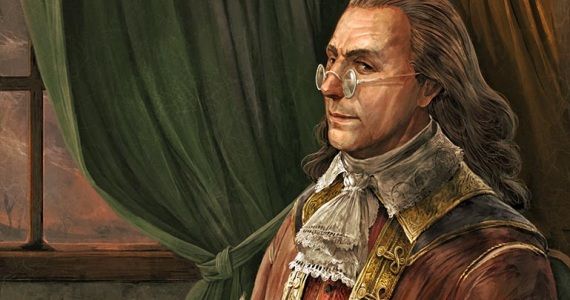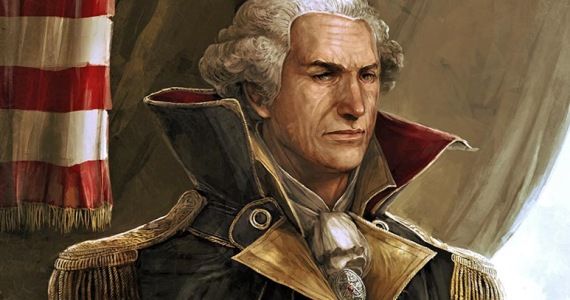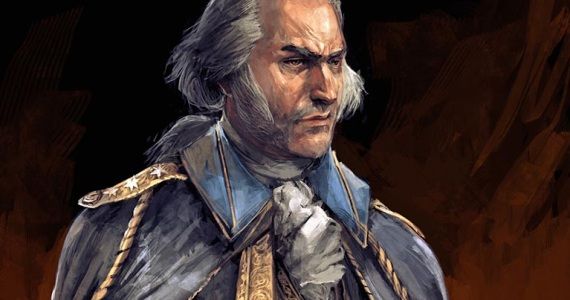Even though the Assassin's Creed series currently prepares for the launch of its fifth installment, Assassin's Creed 3, there are plenty of questions that fans still have about the larger plot. Ubisoft isn't ready to spill the beans on the significance of Desmond or new protagonist Connor, for that matter, but the developers are promising a far more morally complex version of the Templars. As far as we're concerned, the American backdrop of Assassin's Creed 3 sets the stage for political intrigue and betrayal that will make any conspiracy theorist jump for joy.
Any story built around fighting a powerful or ancient evil that hopes to discern itself from its peers must focus their attention on making the evil the interesting part, not just the hero. That was where the original Assassin's Creed started, posing the socialist Assassin Order against the fascist - yet somewhat well-intentioned - Knights Templar. With the arrival of Ezio Auditore in Assassin's Creed 2, it wouldn't be a stretch to say the Assassin/Templar conflict took a backseat to the young Italian's quest for vengeance.
The climax and closing moments of Revelations went to great lengths to strengthen the connection between Ezio's new Assassin Order and Desmond Miles' quest to prevent the Templars from destroying the world. Current Templars have cast off their chainmail in exchange for suits and lab coats as the secret power behind Abstergo Industries. But how did the Renaissance Templars represented by the seemingly grotesque and morally bankrupt family of Borgias make the transition into corporate giants, stopping at nothing to uncover the mysterious Pieces of Eden?
That continuity must be the first issue addressed with Assassin's Creed 3, since even the brutally impressive combat awaiting players won't make bland and 'evil' enemies interesting to dispatch. Considering the new theme of racial and national identity the development team is interested in, a cookie-cutter enemy just won't cut it.
The project's Creative Director Alex Hutchinson, obviously understands the dilution of quality enemies in the series, and explains why the New World has brought the Templars new resolve:
"I think early on one of the fun things in Assassin’s Creed was that the Templars weren’t mindless villains... they were kind of misunderstood — there were a lot of gray zones. Then over the course of the sequels it become more villainous and it also became very entrenched in the Borgias, in very specific characters who were really evil. With Assassin’s Creed III we want to get back to that notion that they think they are doing the right thing. We as players disagree completely, but they honestly believe they are doing the right thing."
Considering that the plot of the series in the minds of many fans currently amounts to: "Templars want to take over everything," exploring the shadowy group's motivations isn't a bad idea - Especially if the team hopes to bring in new fans without confusing them.
But when you talk about mysterious organizations taking a foothold in the New World, one group comes to mind: The Freemasons.
The idea of the modern Freemasons being a reincarnation of the Knights Templar is nothing new, since conspiracy theorists of varying degrees of credibility have often taken the ties between the two societies to extreme conclusions. The film National Treasure is an example of a benevolent association between the two, while others maintain that Washington and the founding fathers were the first to establish a New World Order in a quest for global domination.
While those same founding fathers will appear in Assassin's Creed 3, the fact that Ubisoft has to sell to an American audience will likely preclude a climax in which Washington and Benjamin Franklin voice their desire to kill freedom everywhere. If anything, the confirmed Collector's Editions of the game seem to hint that George Washington may be allied with the Assassins. But that doesn't mean that every historical figure is safe.
In fact, assuming that every Freemason is aware of the society's Templar connections - should there be any - may be misguided. Similarly, it's possible that the Templars infiltrated the Freemasons completely unbeknownst to the more famous members. Washington has been featured alongside Connor in much of the game's artwork, so perhaps the two join forces to rid the Freemasons of any Templar spies hoping to shape the future of America.
We already know that Ubisoft is messing with Boston's historical accuracy, so clearly the team is not restricting themselves to just the facts. We previously pointed out that Charles Lee, a British general who sided with the Americans and competed with Washington for top spot, is the most likely to have some deception linked to his name. But with this recent information from Hutchinson, and knowledge of Lee's somewhat spotty record, he seems to be shaping up as a major antagonist.
Continue to page 2 for the rest on the AC3 Templay-Freemason Theory!
The development team has stressed from the beginning that an American/British war is not the heart of Assassin's Creed 3's story, since Connor is himself a son of both nations, and will be fighting members of both sides. If Lee is capable of finding soldiers who side with his and the Templars goals for the New World, then the insinuation that Connor will be fighting Native Americans, British soldiers and Americans alike makes much more narrative sense.
We know that Connor's allegiance to the Assassin Order and the birth of the United States begins with the slaughter of his Mohawk village. Now if we were really committed to Lee as an antagonist, the fact that he arrived in North America to fight for the British in the French and Indian War from 1754-1763 is extremely interesting. As is the fact that he married the daughter of a Mohawk chief, and had twins. Suddenly the half-British, half-Mohawk ancestry of Connor becomes even more telling. Could Connor be on of these twins?
The years may not work perfectly, since the game's announcement trailer depicts a grown Connor in 1776. Whatever the case, the fact that the image of a Young Connor being threatened by a uniformed soldier is one of just a few that have been released implies a strong connection. The soldier restraining Connor bears more than a passing resemblance to Charles Lee (we'd be shocked if it's not him) so the stage is set for Connor's battle to be both personal and patriotic. Even if Lee was only responsible for the destruction of Connor's village and family, it would make sense that he would align himself with the Templars, and embody villainy in every form.
Since Lee's own national allegiance is somewhat unclear (having abandoned Britain for America, then helped draft attack plans for the British Army while held captive) he would certainly fit the bill for the more complicated sense of enemy that Ubisoft is aiming at. Lee obviously had his own goals throughout the American Revolution, and if those were motivated by a sense of the greater good that he shared with the Templars it would be perfectly reasonable for him to oppose Washington's leadership.
And boy, did he. Publicly berating Washington as unfit to lead, retreating when he had been ordered to support Washington's advance, and ending his military career with a court-martial and procession of men challenging him to duels makes Lee one of the more suspicious figures in the upper ranks of the Continental Army. We're not saying that Lee will be depicted as a Templar authority in Assassin's Creed 3, but considering his experience and obvious willingness to oppose George Washington (not to mention that concept artwork) we wouldn't be surprised if he is.
The point is that while there may be - and in all likelihood will be - a connection between the Templars and the American Freemasons, assuming that it is a simple one would be jumping to conclusions. Ubisoft is promising an enemy that is far more interesting than the last games have tried to produce, so whether we're right on the money or completely off the mark, espionage and treachery are guaranteed.
What do you think of our theories on the conspiracies behind Assassin's Creed 3? Have your own ideas of what enemies could be in store? Leave us your thoughts in the comments.
Assassin’s Creed 3 will be released on October 30, 2012 for the PC, PS3 and Xbox 360.
-
Follow me on Twitter @andrew_dyce.
Source: Game Informer



